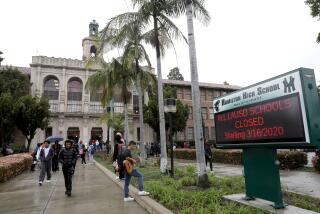Students lose in latest LAUSD board turf war
It was just like old times at the Los Angeles Unified school board meeting last week. The board voted to close two excellent charter schools for reasons that had nothing to do with the quality of education they are providing to students but rather over provincial concerns about turf.
This was the kind of board behavior — common a decade ago — that drove so many frustrated parents and policymakers into the arms of the school reform movement. We had hoped those days were over.
At issue were charter renewals for two Huntington Park schools run by Aspire Public Schools, one of the most highly regarded charter operators in California. At both schools, more than 90% of the students are poor enough to qualify for subsidized lunches and at least half are not fluent in English. Despite student demographics that are usually associated with low performance, these schools’ Academic Performance Index scores are above 800, which the state has set as the target for a school’s proficiency.
What riled the majority on the board was that the schools had contracted outside the district for state-required special-education services. All schools must sign up for such services, which provide professional development and oversight to ensure that special-ed students are receiving a sound education. Most schools must do this through their regional special-ed agency, but charter schools are allowed to go elsewhere for cheaper or more helpful services.
This would be a problem if there were any evidence that Aspire’s students were suffering as a result. But parents whose children have severe disabilities — traumatic brain injury or autism, for example — praised the schools to the board. Even the district’s head of special education said that from everything she’s seen, the schools are doing well with their learning-impaired students.
Regardless of the quality of education, board members Steve Zimmer and Monica Ratliff said they want to ensure that all charter schools contract with L.A. Unified for special-ed services.
Not only is that wrong thinking, it flouts state regulations. L.A. Unified has gone to pains to lower the prices — and improve the services — of its special-education wing, but that doesn’t give it the right to look askance at those who make other choices. Aspire contends that the agency it uses in El Dorado County provides the same amount of oversight and better data services for less money.
Aspire will appeal to the county Department of Education, which should quickly and enthusiastically approve the charter renewals. As for the school board, what it should do is feel ashamed for once again putting students, families and educational achievement at the bottom of its priority list.
More to Read
A cure for the common opinion
Get thought-provoking perspectives with our weekly newsletter.
You may occasionally receive promotional content from the Los Angeles Times.










